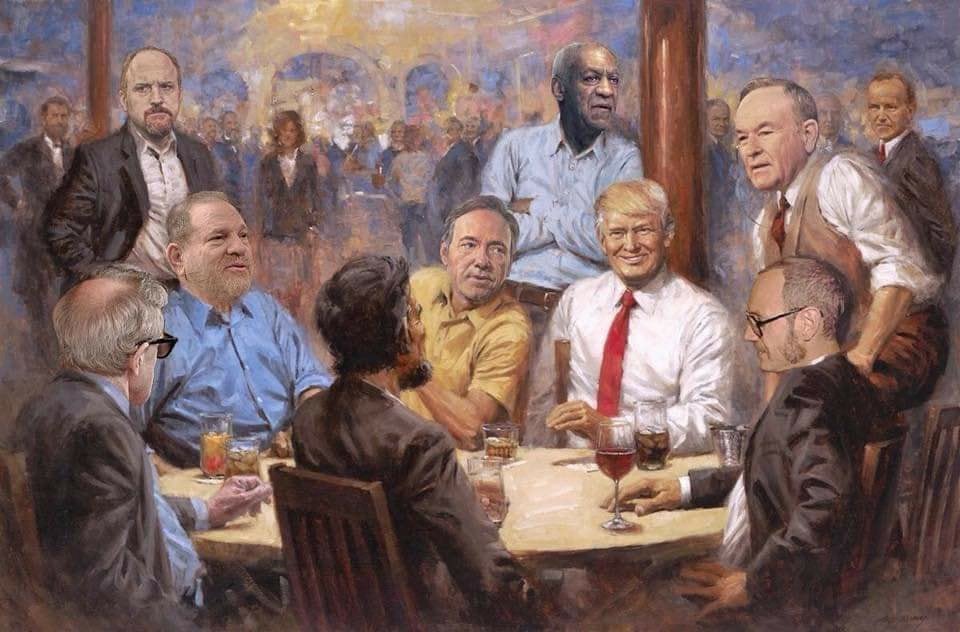If the soul is left in darkness, sins will be committed. The guilty one is not he who commits the sin, but he who causes the darkness.
- Victor Hugo, Les Misérables
This week's featured post is "12 Things to Remember Before You Vote". That's extra-long, so I'll try to keep this shorter than usual.
This week everybody was talking about right-wing political violence
[caption]The window stickers on the mail-bomb suspect's van window.[/caption]
It's hard to know which nightmare to discuss first: the unsuccessful attempt to assassinate 11 Democratic or liberal leaders, including two former presidents, with mail bombs, or the synagogue shooting in Pittsburgh that really did kill 11 people. One, if it had succeeded, would have been the worst single wave of political violence in America since the KKK attacks during Reconstruction. The other raises the specter of the world's most persistent and virulent strain of hatred: anti-Semitism.
Focusing on either one ignores a crime that should ring similar alarm bells: A white man killed two black shoppers at a suburban Louisville grocery store, only minutes after trying to enter a black church and finding it locked. "Just to think that an hour and a half earlier we had 70 people in the church," church administrator Billy Williams said.
In each case, you can look for causes in the psychology of the individuals involved, and undoubtedly you will find something. Individuals are responsible for their own actions. But at the same time, you have to ask "Why now?" In just about all times and places, I suspect, there have been angry misfits who fantasized about acts of violence against whichever people or groups they blamed for their misfortunes. But now, for some reason, the ineffable membrane between violent thought and violent action seems thinner than at any time since the riots and assassinations of 1968. Why?
To me, the answer seems obvious: The President of the United States devotes a great deal of his time and effort to spreading fear-raising conspiracy theories and labeling his critics as enemies of the nation. It's not a coincidence that the mail-bombing suspect had turned the van he lived in into a Trump shrine. Or that the synagogue shooter saw the immigrants in the caravan crossing Mexico as "invaders", and blamed Jews like George Soros for funding it. (The suspect in the synagogue shooting, to be fair, was not a Trump supporter. He believed many conspiracy theories Trump and the right-wing media helped spread, but blamed Trump for letting his daughter convert to Judaism and marry a Jew. “Trump is a globalist, not a nationalist. There is no #MAGA as long as there is a kike infestation.” Trump, in other words, is not MAGA enough for him.)
Trump's defenders (like Hugh Hewitt) want to do a both-sides argument, lumping together right-wing murder and assassination attempts with liberals who refuse to serve Trump officials, or assail them verbally when they appear in public, like when Sarah Sanders was asked to leave the Red Hen Restaurant in Virginia.
"These things are not the same", Jennifer Rubin points out.
Violence is sending bombs to President Trump’s political targets. Violence is body-slamming a reporter who dares to ask a question. Violence is driving a car into a crowd, killing a young woman. Violence is killing unarmed African American youths. Violence is wife beating, sexual assault and child molestation (not demanding that accused wife beaters and sexual predators be held accountable and at the very least disqualified from high office.) Violence is forcibly separating young children from their parents (not calling out such treatment as inhumane).
Violence is not refusing to serve a White House press secretary dinner at a farm-to-table restaurant. It is not yelling at people in restaurants. It is not making mean jokes at a charity event. It is not peacefully occupying a government building to protest.
Hewitt is basically calling for a Henry II standard, which would have held the King blameless for asking "Will no one rid me of this troublesome priest?" shortly before someone killed Thomas Beckett.
But we don't have a both-sides problem. We have an outbreak of right-wing violence that the president encourages.
Brian Klaas sums it up in a tweet-storm that starts like this:
There have always been violent extremists. But when attacks happened under Reagan or Clinton or Bush or Obama, you couldn’t point to insane anti-Semitic conspiracy theories they had recently spread. They didn’t praise neo-Nazis. They didn’t call reporters “enemy of the people”
I wish I had something insightful to say about the rising anti-Semitism, but I don't get it. Most popular American bigotries make sense to me at some level: I can imagine the frame-of-mind of the people who hold those hatreds, point to personal experiences that I could have interpreted to fit those biases, and so on.
But the idea that the random Jews you can find by wandering into a synagogue are somehow to blame for America's problems or my own ... I just don't get it. I don't even know how to argue against it, because a mind that holds that thought seems foreign to me.
It doesn't help that I have a tangential connection: The brother of one of the victims goes to my Unitarian church.
and caravans
When other networks were covering the bombs mailed to Democratic leaders, Fox and the rest of the conservative media was trying to flog the immigrant caravan story. The best discussion of this issue I found was from Beau of the Fifth Column.
but remember to vote
President Obama has no patience for your excuses.
and you also might be interested in ...
The Washington Post published a gripping first-person account of an asylum-seeking woman who was separated from her 15-year-old daughter for nearly five months. The needless cruelty here is very striking.
Another WaPo article by former DHS adviser Scott Shuchart describes what was happening inside DHS when the family-separation policy was being implemented: He describes extreme levels of internal dysfunction and dishonesty, but mostly malfeasance by the political appointees, who were often warned ahead of time (by the career civil servants) of the problems they were about to cause.
But most culpable were the high-level appointees, unwilling to take ownership of what they’d decided to do; lying to their staffs in the expectation that nobody really cared what happened to poor Central American kids; cynical about the notion that most of us who swear an oath to uphold the Constitution actually mean it. I cast about for more to do, but within a month of that June meeting, I realized there was no way to keep my oath and my job.
A new study shows that a minimum-wage worker would need 2.5 jobs to afford a one-bedroom apartment.
Megyn Kelly is done at NBC's Today show, after defending white people wearing blackface on Halloween.
I can't say I have a lot of sympathy for either Kelly or NBC in this spat. NBC knew what it was getting with Kelly: someone who may not be aggressively racist, but has been consistently racially insensitive. In 2013, for example, Kelly jumped into a discussion about black Santa Clauses and said:
For all you kids watching at home, Santa just is white. ... Just because it makes you feel uncomfortable doesn’t mean it has to change. You know, I mean, Jesus was a white man too. … He was a historical figure. That was a verifiable fact.
As I explained at the time, this was not just insensitive, it was ignorant. (Most likely, neither Saint Nicholas nor Jesus was white enough to get service at a Jim Crow lunch counter.) Kelly has a sharp mind, but she also has an oblivious white-people-are-the-center-of-the-universe worldview that she has never bothered to educate herself out of. When NBC hired her, that was already a verifiable fact.
You probably already understand why blackface is inappropriate Halloween makeup for whites, but I feel obligated to spell it out: It's more the history of the thing than the thing itself. By wearing blackface, whites place themselves in the tradition of the minstrel show. You may think you're honoring Martin Luther King or Barack Obama or whoever you're supposed to be, but your intention is not the controlling factor. (Wearing an Obama mask, by contrast, does not evoke minstrelsy, and can be OK if done with respect.)
As I've tried to explain on several occasions, some words and symbols have such a strong historical resonance that your innocent intention can't salvage them. You may believe a swastika just looks cool, and weren't thinking about Nazism at all when you got that tattoo. It doesn't matter; the symbol has a meaning independent of your intention.
In the Washington Post on Tuesday, Monica Hesse summed up what I'm now thinking about transgender policy and a lot of other sex-and-gender-related issues: Why exactly do we need to know what genitalia other people have, or what exactly they do with their biological equipment when they're with consenting adults?
Hesse was responding to a leaked HHS proposal to define transgenderism out of existence:
The department argued in its memo that key government agencies needed to adopt an explicit and uniform definition of gender as determined “on a biological basis that is clear, grounded in science, objective and administrable.” The agency’s proposed definition would define sex as either male or female, unchangeable, and determined by the genitals that a person is born with, according to a draft reviewed by The Times. Any dispute about one’s sex would have to be clarified using genetic testing.
Other than the fact that it wouldn't work because life is not that simple, there's the question of what the policy is trying to accomplish. Hesse writes:
The most charitable interpretation for the government’s proposal is that we humans, as a species, have a need to organize things, and put them in categories. That we are uncomfortable with the unknown, and uncomfortable with being uncomfortable. That our aversion to this is so strong that we would rather ask unspeakably rude questions to strangers — So, are you a boy or a girl? So, who’s the wife in your same-sex relationship? — than accept that there are things we don’t need or deserve to know.
What if we allowed ourselves to remain uncomfortable? What if, instead of looking at other humans as something to be categorized, we saw in them a chance to appreciate the vastness of humanity?
As I've mentioned before, I experienced my own need to categorize when I watched the TV series "Billions". The character Taylor does not claim to be either male or female. Part of me just couldn't let that go: "What is s/he really?" It took some time for me to ask the next obvious question: "Why do I need to know?" But once I had asked that question, it started coming to mind in a lot of other situations.
Any closing I can think of seems inappropriate this week. I'll try to do better next week.












